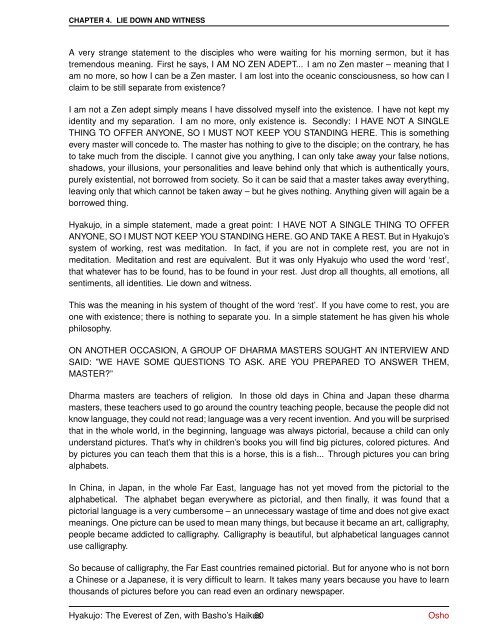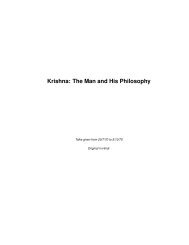Hyakujo: The Everest of Zen, with Basho's Haikus - Oshorajneesh.com
Hyakujo: The Everest of Zen, with Basho's Haikus - Oshorajneesh.com
Hyakujo: The Everest of Zen, with Basho's Haikus - Oshorajneesh.com
Create successful ePaper yourself
Turn your PDF publications into a flip-book with our unique Google optimized e-Paper software.
CHAPTER 4. LIE DOWN AND WITNESSA very strange statement to the disciples who were waiting for his morning sermon, but it hastremendous meaning. First he says, I AM NO ZEN ADEPT... I am no <strong>Zen</strong> master – meaning that Iam no more, so how I can be a <strong>Zen</strong> master. I am lost into the oceanic consciousness, so how can Iclaim to be still separate from existence?I am not a <strong>Zen</strong> adept simply means I have dissolved myself into the existence. I have not kept myidentity and my separation. I am no more, only existence is. Secondly: I HAVE NOT A SINGLETHING TO OFFER ANYONE, SO I MUST NOT KEEP YOU STANDING HERE. This is somethingevery master will concede to. <strong>The</strong> master has nothing to give to the disciple; on the contrary, he hasto take much from the disciple. I cannot give you anything, I can only take away your false notions,shadows, your illusions, your personalities and leave behind only that which is authentically yours,purely existential, not borrowed from society. So it can be said that a master takes away everything,leaving only that which cannot be taken away – but he gives nothing. Anything given will again be aborrowed thing.<strong>Hyakujo</strong>, in a simple statement, made a great point: I HAVE NOT A SINGLE THING TO OFFERANYONE, SO I MUST NOT KEEP YOU STANDING HERE. GO AND TAKE A REST. But in <strong>Hyakujo</strong>’ssystem <strong>of</strong> working, rest was meditation. In fact, if you are not in <strong>com</strong>plete rest, you are not inmeditation. Meditation and rest are equivalent. But it was only <strong>Hyakujo</strong> who used the word ‘rest’,that whatever has to be found, has to be found in your rest. Just drop all thoughts, all emotions, allsentiments, all identities. Lie down and witness.This was the meaning in his system <strong>of</strong> thought <strong>of</strong> the word ‘rest’. If you have <strong>com</strong>e to rest, you areone <strong>with</strong> existence; there is nothing to separate you. In a simple statement he has given his wholephilosophy.ON ANOTHER OCCASION, A GROUP OF DHARMA MASTERS SOUGHT AN INTERVIEW ANDSAID: ”WE HAVE SOME QUESTIONS TO ASK. ARE YOU PREPARED TO ANSWER THEM,MASTER?”Dharma masters are teachers <strong>of</strong> religion. In those old days in China and Japan these dharmamasters, these teachers used to go around the country teaching people, because the people did notknow language, they could not read; language was a very recent invention. And you will be surprisedthat in the whole world, in the beginning, language was always pictorial, because a child can onlyunderstand pictures. That’s why in children’s books you will find big pictures, colored pictures. Andby pictures you can teach them that this is a horse, this is a fish... Through pictures you can bringalphabets.In China, in Japan, in the whole Far East, language has not yet moved from the pictorial to thealphabetical. <strong>The</strong> alphabet began everywhere as pictorial, and then finally, it was found that apictorial language is a very cumbersome – an unnecessary wastage <strong>of</strong> time and does not give exactmeanings. One picture can be used to mean many things, but because it became an art, calligraphy,people became addicted to calligraphy. Calligraphy is beautiful, but alphabetical languages cannotuse calligraphy.So because <strong>of</strong> calligraphy, the Far East countries remained pictorial. But for anyone who is not borna Chinese or a Japanese, it is very difficult to learn. It takes many years because you have to learnthousands <strong>of</strong> pictures before you can read even an ordinary newspaper.<strong>Hyakujo</strong>: <strong>The</strong> <strong>Everest</strong> <strong>of</strong> <strong>Zen</strong>, <strong>with</strong> Basho’s <strong>Haikus</strong> 60 Osho
















